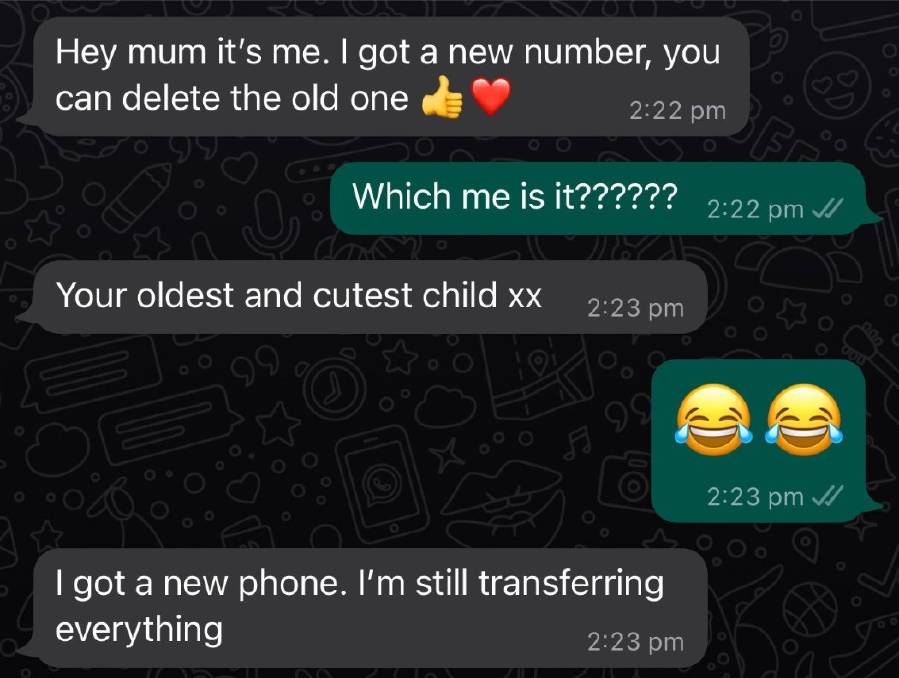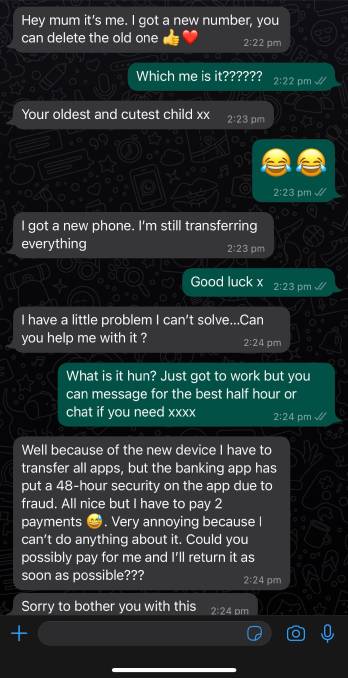Share this article on:
Powered by MOMENTUMMEDIA
Breaking news and updates daily.
The NSW Police State Crime Command’s Cybercrime Squad has warned phone users to remain vigilant following a rise in victims of the scam dubbed “Hi Mum”.

The scam involves the offender sending a text message from an unknown mobile phone number to a person on a messaging application claiming to be their son or daughter. The message then states they've lost their phone, telling the victim they're sending from their new number and to delete the old number.

According to the Cybercrime Squad, offenders may send victims messages along the lines of "Hey Mum it's me. I got a new phone number, you can delete the old one. I got a new phone. I'm still transferring everything."
After the victim engages in conversation, the offender then asks to borrow money or have a payment made on their behalf, generally accompanied with a fabricated excuse as to why they need the cash, which is usually due to a fictitious unavailability of online banking on the "new device". To bolster the message scam's validity, the fake texts generally include a bogus offer to pay the money back.
The Cybercrime Squad has also found that another example of the scam messages in circulation refers to "avoiding online fraud", a technique scammers have employed aimed at increasing the text's credibility.
"The banking app has put a 48-hour security on the app due to fraud. All nice but I have to pay two payments," one of the scam messages stated.
The offender will usually claim it is a matter of urgency before providing details for the payment.

Victims are predominantly aged 55 years and older, with people in NSW and Victoria accounting for more than 50 per cent of "Hi Mum" scam victims, followed by Western Australia and Queensland.
According to Matthew Craft, Cybercrime Squad Commander and Detective Superintendent, the scam dates back to October 2021, however, there has been a significant increase in reports since May 2022.
"We encourage people to look out for suspicious behaviours demonstrated by these scammers; including their failure to personalise any communication and excuses as to why they can't speak on the phone.
"If you receive a suspicious message on your mobile, particularly through social media or encrypted messaging, reach out to your relative by an alternative method of communication or call to confirm it is in fact them.
"Many parents are falling victim because they're simply nice people who are concerned for their child's welfare," Detective Superintendent Craft said.
Fraudulently obtained funds are usually quickly moved from bank accounts into cryptocurrency, Cybercrime Squad further explained, which prevents the likelihood of victims getting their money back.
If you have lost money to a scam, contact the bank or a financial institution as soon as possible and report the matter to police.
Visit the Scamwatch website for more advice on how to avoid scams and what to do if you or someone you know is a victim of a scam.
Anyone with information in relation to cyber crimes and scams is urged to contact Crime Stoppers on 1800 333 000.
[Related: NHS systems across UK hit by cyber attack]

Nastasha is a Journalist at Momentum Media, she reports extensively across veterans affairs, cyber security and geopolitics in the Indo-Pacific. She is a co-author of a book titled The Stories Women Journalists Tell, published by Penguin Random House. Previously, she was a Content Producer at Verizon Media, a Digital Producer for Yahoo! and Channel 7, a Digital Journalist at Sky News Australia, as well as a Website Manager and Digital Producer at SBS Australia. Nastasha started her career in media as a Video Producer and Digital News Presenter at News Corp Australia.
Be the first to hear the latest developments in the cyber industry.